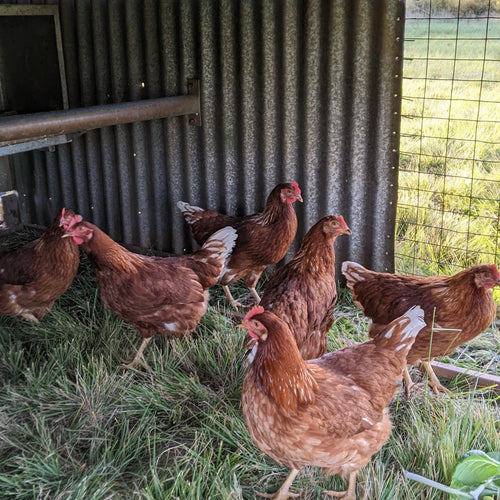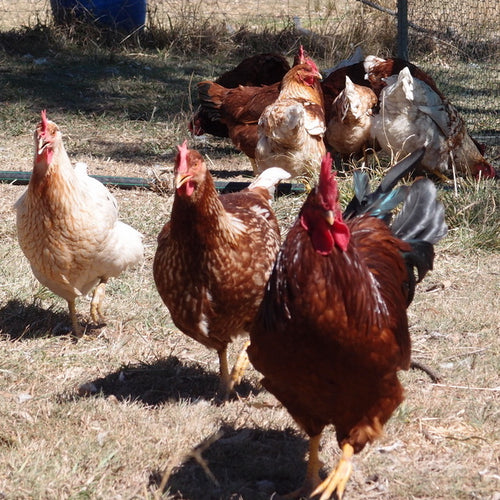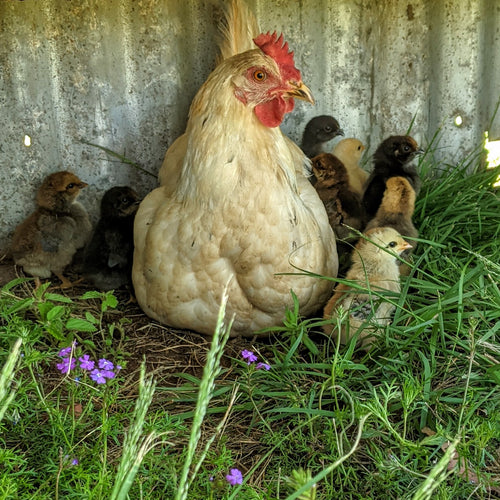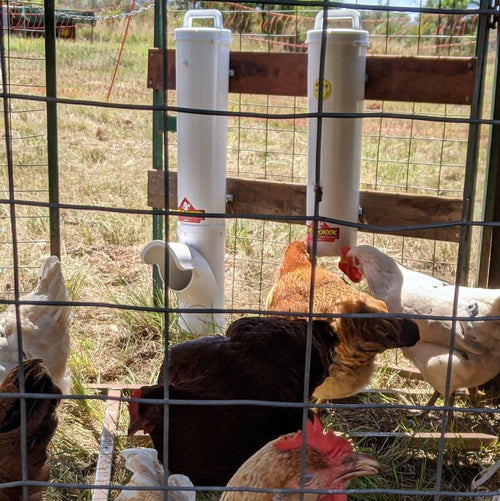Getting started with chickens - Linda from Greenhaven
Farmer Liz: Today I have another interview in my series on "getting started with chickens". Linda from the blog Greenhaven lives in the country on forty odd acres with her husband and three of her children. As part of their effort to live in a way that is thoughtful of this planet they garden, raise chooks and live fairly frugally. They find chooks fit in perfectly with their lifestyle.
Linda: We have quite a few chooks. We have an Australorp rooster and six hens. We have a Dorking rooster and three hens. We also have an Isa Brown and a bantam. We also have three geese.
The geese are a recent addition because we needed to keep the grass down in the orchard. Our chooks are for meat, eggs, pest control and to add fertility to our property. We carefully chose breeds that should be suitable for our climate and be good for meat. I recently wrote a couple of posts on our chooks and you can read about them here and here.
FL: Where did you get your first chickens and how do you now replenish your flock?
L: We inherited chooks when we bought the place. I loved them so much that we went to a chook auction to buy more. I had never been to any type of auction prior to this and I got very excited when I realised I could always win the bid if I just paid the most! Lol! We ended up buying more than I could humanely put in the car so I gave a bunny (yes I know… I told you I got carried away) to a man I had met at the auction. Now we are just breeding our own birds. The bantam has successfully sat on other breed’s eggs several times now. Bantams are great mums!
FL: Fixed chicken run or movable pen? Why?
L: We have a pen in the orchard so that we can run the chooks in there, and another near the house. We separate our poultry when they are having personality issues (which often happens with chooks) and the underdogs come closer to the house. We occasionally set up temporary pens around a spent garden so that the chooks can eat the last of the vegetable remains and drop their fertiliser on the bed at the same time. If we hand raise chickens, we use a little movable pen for an hour or two each day to get them used to the outside world. When they’re old enough they join the others.
FL: How do you integrate your chickens into the rest of your garden/farm?
L: We use the orchard flock to keep down pests. They love to scratch all day looking for bugs etc. and all the while, they are also fertilising our fruit trees. It’s best to keep them away from citrus though. Citrus are shallow rooted (so chooks can damage them by scratching) and they don’t like too much nitrogen when they’re setting fruit.
We are in the process of developing a new orchard in a very sad looking paddock. We intend to put all our Dorkings in this orchard. They will help us improve the soil in there.
FL: What is your biggest chicken challenge at the moment?
L: Arrghhh! That’s an easy one to answer. I can’t stop the chooks flying over the fence. They are all so young and healthy! I have cut their wings but they seemed to overcome their lopsidedness within a week! I probably should have cut more off their wings. We have the orchard fenced to keep them in, but also have very good fencing around our yard to protect the veggie garden. At the moment they are getting out of the orchard but can’t get over the fence around the yard. If you want veggies you must KEEP THE CHOOKS OUT!
FL: What is the best thing about keeping chickens?
L: I love everything about my chooks! I love the way they move, the noises they make and how they make me feel calm. They give me eggs and meat and work very hard at pest control and fertility. They are amazing!
FL: What is your advice to new chicken owners? What do know now that you wish you knew before you got chickens?
L: Don’t be daunted at the thought of owning them. Chooks are little, easy to care for and so useful. Throw yourself in feet first and you’ll be fine.
I would add though, you need to be prepared for deaths. They happen. It’s just a fact of life when you own chooks. We’ve lost chooks to foxes, through old age and others just seemed to drop dead for no reason. It doesn’t happen often but it is inevitable so it’s good to prepare yourself mentally.
Again, fence any areas where you will be growing a garden because chooks make short work of plants.
FL: Any advice for keeping chickens around children (or children around chickens!)?
My children are great around the chooks. They have been taught to be thoughtful of animals. Chook chasing is definitely frowned upon and they know it!!! One of my children spends hours with them and she takes time getting them to hand feed. They have a much stronger bond with her than the rest of us.
Sometimes roosters (and occasionally hens) can be aggressive. If you have children and this is the case, they have to go (the poultry, not the kids). Children are at a level where the birds could fly at their faces and attack with their feet and spurs.
FL: thanks so much for joining in Linda! What excellent advice, I really like to see how you integrate the poultry into your orchard, and thanks for being honest about their tendency to get into gardens (and to occasionally drop dead!), all things that need to be considered when getting started with chickens. Now if you'd like to comment or ask Linda a question, please head over to her blog.
By the way, my chicken eBook is now available if you want to know more about backyard chickens and using chicken tractors. More information over at the chicken tractor ebook blog. Or you can get it directly from my shop on Etsy (.pdf format), or Amazon Kindle or just send me an email eight.acres.liz {at} gmail.com.
or just send me an email eight.acres.liz {at} gmail.com.
What's the eBook about?
Chickens in a confined coop can end up living in an unpleasant dust-bowl, but allowing chickens to free-range can result in chickens getting into gardens and expose them to predators.
A movable cage or “chicken tractor” is the best of both options – the chickens are safe, have access to clean grass, fresh air and bugs. Feed costs are reduced, chickens are happier, and egg production increases.
But how do you build a chicken tractor? What aspects should be considered in designing and using a chicken tractor effectively? In this eBook I aim to explain how to make a chicken tractor work for you in your environment to meet your goals for keeping chickens.
I also list what I have learnt over 10 years of keeping chickens in tractors of various designs and sizes, from hatching chicks, through to butchering roosters.
Reviews of the Design and Use a Chicken Tractor
























Leave a comment